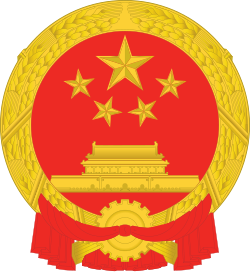Provisions on Ecological Governance of Network Information Content
The Provisions on Ecological Governance of Network Information Content is a regulation of the People's Republic of China that came into effect on March 1, 2020. The regulation defines the scope of legal expression for service platforms and content creators, while also encouraging them to create content that conforms to China's official values. It also strictly prohibits online violence, human flesh searches, and account manipulation. HistoryThe Regulations came into effect on March 1, 2020.[1][2] It mentions that its purpose is to "cultivate and practice the core socialist values", "take online information content as the main governance object", and "establish and improve a comprehensive network governance system, create a clean and clear cyberspace, and build a good network ecology".[3] The "interpretation" article published by the State Internet Information Office pointed out that the formulation of the Regulations reflects the requirements put forward by the Fourth Plenary Session of the 19th Central Committee of the Chinese Communist Party to "establish and improve a comprehensive network governance system, strengthen and innovate Internet content construction, implement the main responsibility of Internet companies for information management, comprehensively improve network governance capabilities, and create a clean and clear cyberspace". It also quoted the remarks of General Secretary of the Chinese Communist Party Xi Jinping that "the chaotic cyberspace and deteriorating ecology are not in the interests of the people", and believed that the Regulations are in line with the development concept of "putting people first".[4] ContentCompared with the regulations formulated by the Cyberspace Administration of China in the past, the requirements of the "Regulations on the Ecological Governance of Network Information Content" are more targeted and strict than before. Regarding the self-censorship of content platforms that has always existed, the "Regulations" also upgraded the previous "requirement for self-discipline" to explicit provisions.[1] The Regulations require that online content creators “shall not” produce, copy or publish the following content:[1][5]
The Regulations require content platforms to “prevent and resist” the following content:[1]
The Regulations encourage online content creators to produce, copy and publish the following content:[1]
The Regulations state that online information content service platforms should establish an online information content ecological governance mechanism, improve systems such as information release review, comment review, real-time inspection, emergency response and online rumor prevention, and if illegal information is found, immediate measures should be taken in accordance with the law, relevant records should be kept, and reports should be made to the relevant competent authorities.[1] The new regulations also propose that a user account credit management system should be established to provide corresponding services based on the credit status of user accounts.[6] References
|
||||||||||||||||||||||||||||
Portal di Ensiklopedia Dunia














